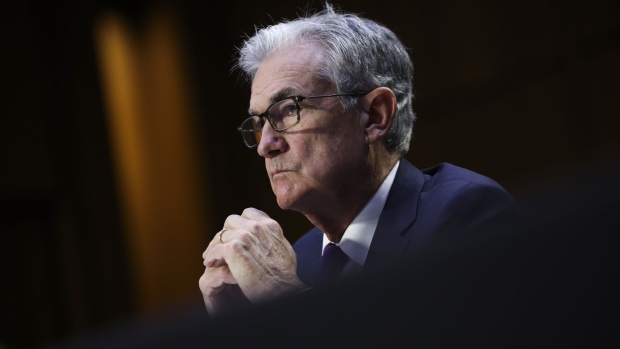Sep 28, 2021
Biden Choice on Powell Comes Down to Heeding Yellen or Warren
, Bloomberg News

(Bloomberg) -- President Joe Biden’s decision on who will lead the Federal Reserve has boiled down to a choice between heeding the advice of his Treasury secretary, Janet Yellen, or the warnings of a progressive leader who ran against him in 2016, Massachusetts Senator Elizabeth Warren.
Warren broke months of silence on whether she’d support a second term for Powell on Tuesday, declaring in a Banking Committee hearing where he testified that she would oppose him and vilifying him as a “dangerous man.” Her comments instantly put Biden on the defensive as he considers one of his most consequential nominations.
The president must now choose between Powell, supported by Yellen and regarded as a shoo-in for bipartisan confirmation, or mollifying the ascendant progressive wing of the party embodied by Warren with a riskier, more liberal nominee who could draw opposition from moderate Democrats as well as most Republicans.
White House officials were aware of Warren’s dissatisfaction with Powell, who is in his first term as chair of the central bank. She said she believes he’s dangerous because his lax regulation of financial markets risks a fresh crisis and future taxpayer bailouts.
Powell’s renomination would likely enjoy broad bipartisan support. In addition to Yellen, a key moderate Democrat, Senator Jon Tester, has publicly backed him. So have several Republican senators, including Rob Portman of Ohio, Thom Tillis of North Carolina, Mike Rounds of South Dakota, Jerry Moran of Kansas and Steve Daines of Montana.
Fed Governor Lael Brainard is seen as the favorite alternative to Powell among progressive Democrats, but Warren didn’t suggest any specific nominee on Tuesday. It isn’t clear how many Senate Democrats would support Brainard for chair, and most Republicans would likely oppose her.
Several progressive groups have told White House officials both publicly and privately they would support Brainard’s nomination to lead the central bank. White House advisers have considered a plan to renominate Powell while appointing Brainard to be vice chair of supervision, the Fed’s chief regulator.
Warren is so far the only senator to come out against Powell’s renomination. But other Democrats have questioned his views on financial regulation, including the Banking chairman, Sherrod Brown of Ohio.
Brown has yet to endorse Powell but made a push for a more diverse Federal Reserve on Tuesday. Democratic Senator Sheldon Whitehouse of Rhode Island has said he wants Powell to act more strenuously on climate issues.
One White House official downplayed the impact of Warren’s announcement, saying anyone Biden picked would divide both Democrats and Republicans. Another Biden ally characterized Warren’s declaration as an attempt to gain leverage with the White House as she fights to keep Democrats’ social spending legislation as large as possible.
The bill is winding its way through Congress at the same time Biden considers the Fed chair nomination. Moderate senators, including Democrat Joe Manchin of West Virginia, have said they would not support the $3.5 trillion price tag progressives desire.
White House Press Secretary Jen Psaki said she had “nothing further” on Warren’s remarks during her daily press briefing.
Nearly 90% of economists surveyed by Bloomberg this month expect Biden to keep Powell in the job, an overwhelming majority that’s increased from June. Brainard is seen as the likely choice by just 9% of economists surveyed.
Market jitters may follow Warren’s surprise move. Nearly two-thirds of the economists predicted a near-term rally in stocks if Powell is renominated, while more than half predicted stocks would decline in the near term after a Brainard pick.
Though Donald Trump appointed Powell to his current job, the former president rapidly soured on him after the Fed increased interest rates under Powell’s watch. While Biden aides and allies have been pleased with Powell’s handling of the economy during the pandemic, appointing Brainard or another progressive favorite would allow Biden to put his stamp on the Federal Reserve and curry favor with the liberal wing of his party.
And while Powell would draw bipartisan support, the White House cannot take for granted the votes of a majority of Senate Republicans. Senator Pat Toomey of Pennsylvania, the senior Republican on the Banking Committee, last week strongly criticized Powell for allowing what he regards as the politicization of the Fed and for continuing a massive bond-buying program he blames in part for this year’s spike in inflation.
Toomey and a number of other Republicans have declined to endorse Powell for another term before Biden makes a pick.
©2021 Bloomberg L.P.






